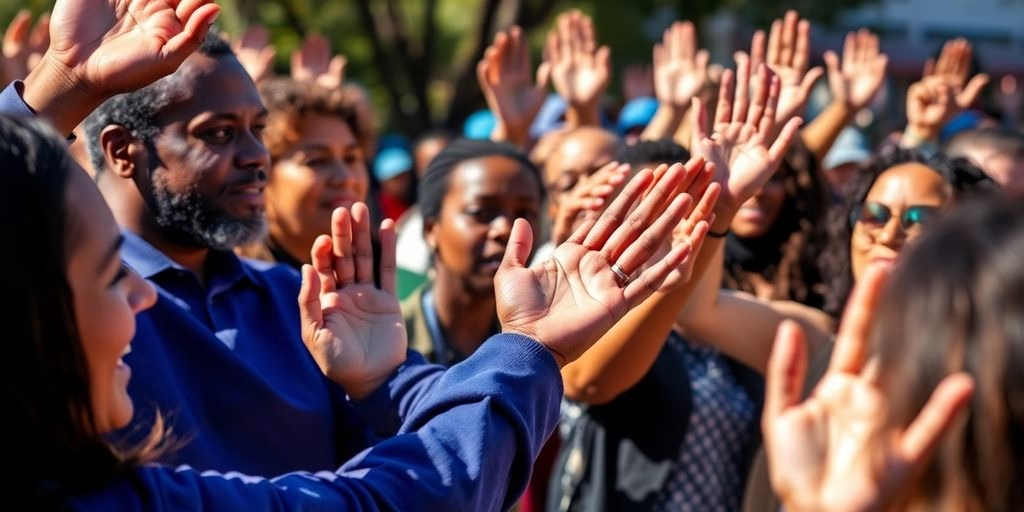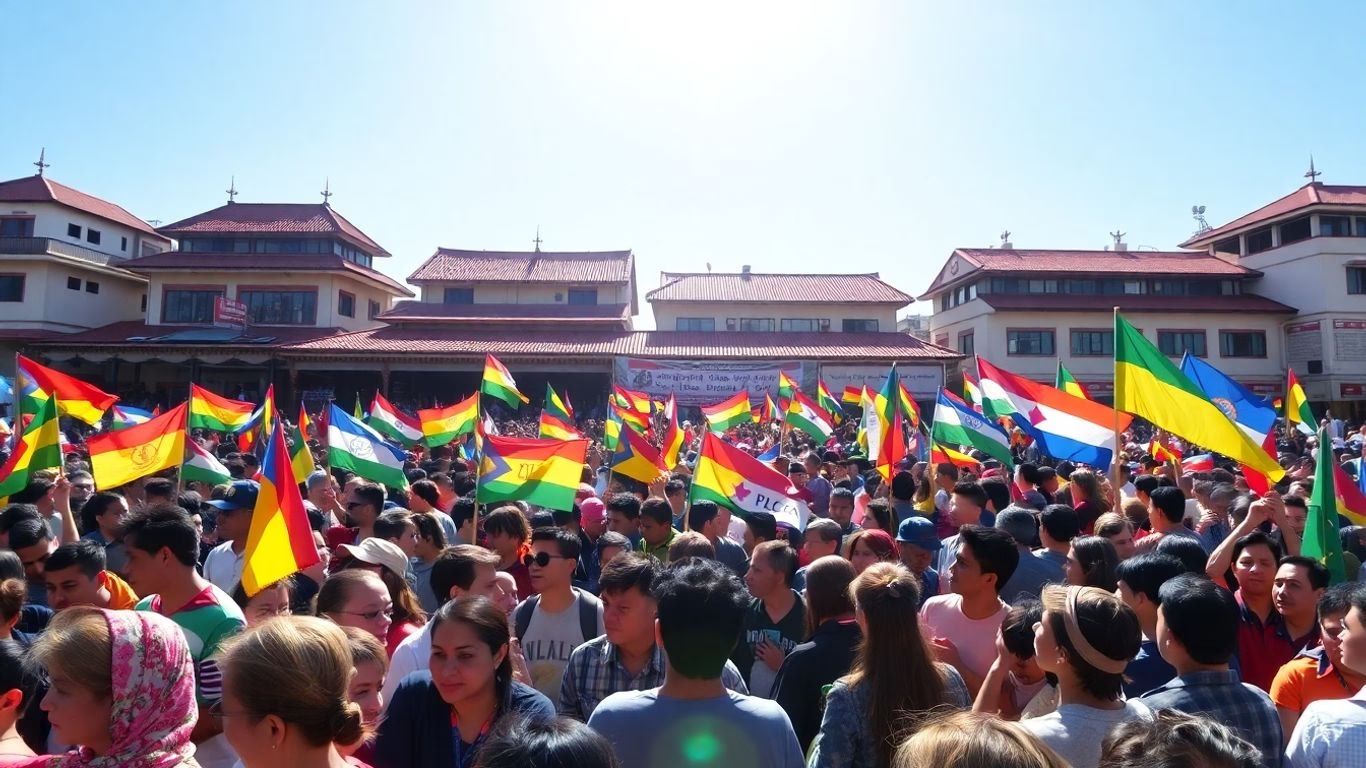Getting involved in LGBTQ+ justice is a powerful way to contribute to a more equitable world. It’s not just about big gestures; small, consistent actions can create significant change. Whether you’re looking to offer your skills, support existing organizations, or advocate for policy shifts, there are many avenues to make a real difference. This guide offers practical ways to show up, stand in solidarity, and support the LGBTQ+ community year-round.
Key Takeaways
- Show up and stand in solidarity through everyday acts of allyship and consistent support beyond Pride Month.
- Volunteer your time and skills, whether through pro bono work, supporting LGBTQ+ charities, or contributing during holidays and weekends.
- Support LGBTQ+ networks and societies by joining existing groups, starting new ones, or driving engagement through creative events.
- Engage in mentorship and education by participating in programs, sharing lived experiences, and empowering young LGBTQ+ individuals.
- Raise funds and awareness for causes, support external organizations, host fundraising events, and create educational spaces.
Show Up and Stand in Solidarity
Showing up for LGBTQ+ justice isn’t just about grand gestures; it’s about consistent, everyday actions that build a more inclusive world. Think of it as planting seeds that grow into a stronger community. It’s about being present, not just when it’s convenient or trendy, but all the time. This means actively listening to LGBTQ+ voices, respecting their experiences, and making sure your own actions reflect that respect. Even small things, like adding your pronouns to your email signature or social media, can make a big difference in normalizing inclusive language and creating safer spaces for everyone. It signals that you’re an ally, and that you care about creating an environment where people feel seen and valued.
Everyday Acts of Allyship
Being an ally is a continuous practice, not a one-time event. It starts with simple, consistent choices:
- Use correct pronouns: Always use the pronouns a person has shared. If you’re unsure, it’s okay to politely ask. This shows respect and acknowledges their identity.
- Educate yourself: Take the initiative to learn about LGBTQ+ history, issues, and terminology. Don’t rely solely on LGBTQ+ individuals to educate you.
- Speak up against prejudice: Challenge homophobic, biphobic, or transphobic jokes or comments when you hear them, even if it feels uncomfortable. Your voice matters.
- Share your pronouns: Including your pronouns in your email signature, social media bio, or when introducing yourself helps normalize the practice and makes it easier for others to share theirs.
True allyship means showing up consistently, not just during Pride Month. It’s about integrating inclusive practices into your daily life and interactions, making a tangible difference year-round.
Consistent Support Beyond Pride Month
Pride Month is a vital time for celebration and visibility, but the fight for LGBTQ+ equality doesn’t end when June does. Sustained support is what truly drives change. This means continuing to advocate, donate, and show up for the community throughout the year. Think about how you can integrate LGBTQ+ support into your regular routines and commitments. Are there local LGBTQ+ organizations that could use help with ongoing projects? Can you commit to attending events or supporting businesses that are LGBTQ+ friendly on a regular basis? Consistency is key to building lasting change and demonstrating genuine solidarity.
Fostering Inclusive Workplaces
Creating an inclusive workplace benefits everyone. It’s not just about policies; it’s about culture. This involves actively promoting diversity and inclusion in hiring practices, ensuring equal opportunities, and creating an environment where LGBTQ+ employees feel safe, respected, and valued. Consider joining or starting an LGBTQ+ employee resource group (ERG) to provide a space for support and advocacy. Encourage open conversations about LGBTQ+ issues and provide training on diversity and inclusion. When employees feel a sense of belonging, they are more engaged and productive, and the entire organization thrives.
Volunteer Your Time and Skills

Contributing Through Pro Bono Work
If you have legal skills, offering pro bono services can be incredibly impactful. Many organizations need help with everything from setting up non-profits to navigating complex legal issues. For instance, groups like GLAD Legal Advocates & Defenders (GLAD Law) often seek legal volunteers to support their work in advancing justice and equality for LGBTQ+ individuals. Even a few hours can make a significant difference in helping these organizations operate effectively and pursue their important missions.
Supporting LGBTQ+ Charities
Beyond legal work, countless charities and community groups rely on volunteers for all sorts of tasks. Think about helping out at a local LGBTQ+ center, assisting with administrative duties, organizing events, or even just lending a hand with mailings. Many organizations, like YouthLine, which offers peer support for 2SLGBTQ+ youth, depend on volunteers to keep their services running. They often need help with everything from answering calls and texts to managing their online presence. Your time is a direct investment in their ability to serve the community.
Making a Difference During Holidays and Weekends
Sometimes, the most needed support comes during times when staff might be stretched thin or when community events are happening. Volunteering your time on weekends or during holiday seasons can be particularly helpful. Many organizations host special events or need extra hands for outreach during these periods. Even a few hours can provide much-needed support and show solidarity. It’s a great way to connect with the community and contribute directly to causes you care about.
Support LGBTQ+ Networks and Societies
Lots of universities and workplaces have groups specifically for LGBTQ+ people and their allies. These networks are super important for building community and making real changes. They often put on events, share information, and provide a safe space for people to connect. Showing up to these events and participating is a great way to show your support.
Joining University and Workplace Groups
If your school or job has an LGBTQ+ network or society, consider joining. It’s a fantastic way to meet new people, learn more about the community’s experiences, and get involved in activities. These groups are often the backbone of support within an institution.
Initiating New Community Spaces
Don’t see a group that fits? Maybe it’s time to start one! Creating a new network from scratch can be incredibly rewarding. It means you can build a space that truly meets the needs of your community, whether that’s at school, work, or even in your local neighborhood. Think about what kind of support or activities would be most helpful.
Driving Engagement Through Creative Events
Once you’re part of a network, think about how to make it even more active. Running creative events can really boost engagement. This could be anything from a fun drag bingo night that raises money for a good cause, to panel discussions that tackle important issues. Events are a great way to bring people together, raise awareness, and even raise funds for LGBTQ+ charities.
Engage in Mentorship and Education
Sharing your knowledge and experiences can be incredibly impactful for the LGBTQ+ community. It’s about more than just giving advice; it’s about building confidence, offering guidance, and helping individuals grow.
Participating in Mentoring Programs
Formal mentoring programs can be a fantastic way to connect with and support LGBTQ+ individuals. These programs often pair people based on shared interests or career goals, creating a structured environment for growth. Think about joining a program through a university, a workplace affinity group, or an external organization. It’s a chance to share what you’ve learned and help someone else navigate their path. Many organizations are looking for mentors, and the commitment can be really rewarding. You might even consider starting a new program if you see a gap in your community.
Sharing Lived Experiences Through Reverse Mentoring
Reverse mentoring flips the traditional model, where junior members or those with specific lived experiences mentor more senior individuals. This is a powerful tool for education and empathy building. For LGBTQ+ individuals, this can mean sharing insights into their experiences, challenges, and perspectives with leaders who might not have the same background. This exchange helps to break down barriers and foster a more inclusive understanding from the top down. It’s a way to ensure that leadership is informed by the realities faced by the community they serve. You can advocate for or participate in these programs within your own workplace or community groups.
Empowering Young LGBTQ+ Individuals
Young people in the LGBTQ+ community often face unique challenges as they figure out who they are and how to express themselves. Mentorship can provide them with a safe space to ask questions, explore their identity, and build resilience. This could involve anything from helping with career advice to simply being a supportive presence. Organizations like YouthLine are dedicated to amplifying youth voices and providing resources, showing just how important this support is. Getting involved with such groups means you’re directly contributing to the well-being and future success of young LGBTQ+ people. You can find ways to volunteer your time or share resources through their learning library to become a stronger advocate. Check out resources to help you make a difference.
Mentorship is a two-way street. While you’re guiding others, you’re also learning and growing. It’s an opportunity to gain new perspectives and deepen your own understanding of the challenges and triumphs within the LGBTQ+ community. This shared journey can be incredibly enriching for everyone involved.
Raise Funds and Awareness for Causes

Sometimes, the most direct way to help is by putting your money and your voice to work. Raising funds and spreading the word about LGBTQ+ causes can make a tangible difference, supporting organizations that provide vital services and advocate for change. It’s about more than just donating; it’s about actively participating in the movement and helping to create a more informed and supportive society.
Supporting External LGBTQ+ Organizations
There are so many groups out there doing incredible work, from providing direct support to individuals to pushing for legal protections. Think about organizations that offer crisis hotlines, community centers, or legal aid. Your financial contributions, no matter the size, help keep these essential services running. It’s a way to directly impact the lives of LGBTQ+ individuals and contribute to broader equality efforts. You can find directories of organizations seeking support, which can be a great starting point for identifying causes that align with your values. Many groups focus on specific needs, like youth support, trans rights, or historical preservation, so finding a good fit is usually possible.
Hosting Fundraising Events
Getting creative with fundraising can be a lot of fun and incredibly effective. You don’t need to be a professional event planner to make a difference. Consider a simple bake sale, a trivia night at a local pub, or even a sponsored walk or run. If you’re part of a workplace or a social group, organizing a team event can amplify your impact. Remember to clearly communicate the purpose of the fundraiser and where the money will go. Transparency builds trust and encourages more people to participate. Even small events can generate significant funds and, just as importantly, raise awareness about the issues.
Creating Educational Spaces for All
Education is a powerful tool for change. You can help by creating spaces where people can learn about LGBTQ+ history, issues, and the importance of allyship. This could involve organizing panel discussions, film screenings followed by Q&A sessions, or even setting up information booths at local events. The goal is to foster understanding and empathy, breaking down misconceptions and building bridges. Sharing accurate information and personal stories in a respectful environment can truly shift perspectives. It’s about making complex topics accessible and encouraging open dialogue, helping everyone become a better ally.
Building awareness isn’t just about talking; it’s about creating opportunities for people to connect with the issues on a deeper level. When people understand the ‘why’ behind the fight for equality, they are more likely to get involved and stay involved.
Advocate for Policy and Legal Change
Pride Month is a time for celebration, but it’s also a reminder of the ongoing fight for equality. The roots of Pride go back to protests like the Stonewall Riots in 1969, a major turning point for LGBTQ+ rights. Even today, significant challenges remain. For instance, research shows that a large percentage of LGBTQ+ employees still feel they need to hide their identity at work. This means our activism needs to be more than just symbolic gestures; it needs to create real, lasting change.
Understanding the Roots of Pride
It’s easy to get caught up in the parades and parties, but remembering why Pride started is important. It began as a demand for basic rights and recognition. Understanding this history helps us see why the fight for LGBTQ+ justice is still so necessary. It’s about more than just visibility; it’s about securing equality and safety for everyone in the community.
Addressing Persistent Challenges
Despite the progress made, many LGBTQ+ individuals still face discrimination and barriers. Nearly 40% of LGBTQ+ employees in the UK, for example, feel they must conceal their identity at work. This lack of full acceptance creates a difficult environment and highlights the need for continued advocacy. We need to push for workplaces and communities where everyone can be their authentic selves without fear.
Taking Action Beyond Symbolic Gestures
So, how do we move beyond just attending events? It starts with looking at the policies in our own universities and workplaces. Are they truly inclusive of all gender identities and sexual orientations? If not, speak up. Suggest improvements and push for updates. Many employee networks actively contribute to policy changes, especially concerning transgender colleagues or parental leave. Getting involved with groups like the Human Rights Campaign can also provide resources and support for these efforts. Remember, consistent action, even in small ways like sharing your pronouns, contributes to a larger movement for change.
Keep the Momentum Going
So, we’ve talked about a lot of ways to get involved, from joining university groups to supporting charities. It’s easy to feel overwhelmed, but remember, even small actions add up. Showing up for Pride Month is great, but true support means being an ally all year round. Whether it’s sharing your pronouns, listening to others, or donating your time, every bit helps. Don’t be afraid to start small, maybe by attending a local event or learning more about the issues. The goal is to create a more inclusive world, and that’s something we can all contribute to, one step at a time.
Frequently Asked Questions
How can I be a good ally to the LGBTQ+ community?
You can show your support by doing simple things every day, like sharing your pronouns in your email or social media. It also means sticking up for LGBTQ+ people all year, not just during Pride Month. Showing up to events and listening to people’s stories without judging them makes a big difference.
What are some ways to volunteer my time and skills?
Volunteering your time is a great way to help. Many places need help, especially during holidays or weekends. If you’re studying law, you can offer free legal help to LGBTQ+ people through school clinics or organizations.
How can I get involved with LGBTQ+ groups at school or work?
Many schools and workplaces have groups for LGBTQ+ people and their allies. Joining these groups is a good way to meet people and help plan events. If there isn’t a group, you could even start one!
What does it mean to mentor and educate others in the LGBTQ+ community?
You can help by joining programs that connect experienced people with younger LGBTQ+ individuals who need guidance. Also, teaching others about LGBTQ+ issues, like through sharing your own experiences, can help everyone learn and grow.
How can I help raise money and awareness for LGBTQ+ causes?
You can raise money for LGBTQ+ charities by hosting events like bake sales or fun runs. Creating spaces where people can learn about LGBTQ+ topics also helps spread awareness and understanding.
Why is it important to advocate for policy and legal changes for LGBTQ+ rights?
It’s important to remember that Pride started as a protest for rights. Even though things have improved, there are still challenges. Taking action means supporting laws and policies that protect LGBTQ+ people, not just celebrating during special months.





Leave a Reply